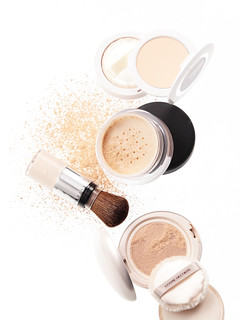| Cosmetics (Photo credit: My Sight, as You See.) |
* Mineral oil (found in baby oil) - Mineral oil can clog your pores, prevent skin from breathing, and stop toxins from being eliminated from the skin. It can even steal vital vitamins and minerals from the body. In the worst case scenario, mineral oil has even been linked to diseases like pneumonia by weakening normal lung function.
* Sodium lauryl sulfate and sodium laureth sulfate - These are found in many soaps. They remove moisture from the skin, irritate the skin, and can cause hair loss. Sodium lauryl sulfate which is found in many shampoos, soaps, and even mouth wash is also the same ingredient that's used to degrease car engines! Sodium laureth sulfate is usually mixed with a chemical known as dioxane which is a known carcinogen.
* Propylene glycol - This can cause liver and kidney damage. If it's in mouthwash with more than 25% alcohol, then it can even lead to throat cancer.
* Isopropyl alcohol - This kills germs, but be careful and use it sparingly in a well-ventilated area. If not this can cause inhalation poisoning.
* Flower/floral water - These are found in many unnatural soaps and are used to scent them. They can lead to allergies. Read the ingredient labels and check for natural hydrosols; those are the kind of fragrances that are usually okay to use.
* Paraffin wax - This is found in some candles. Paraffin wax is a by-product of petroleum. When burned, this puts toxins into the air which are bad for the lungs.
* Dyes and pigments - Watch out for FD&C and D&C dyes as these can be carcinogenic.
* Diethanolamine (DEA) - This is another known carcinogen.
* Aluminum - This is found in deodorants. It may cause cancer, especially breast cancer. Aluminum is also bad for the brain and has been linked to brain disorders like Alzheimer's.
Even common household furniture, electronics, toys, and baby bottles can contain harmful chemicals. There can be toxic flame retardants in your electronics, plastic toys can contain phthalate plasticizers and lead, and baby bottles can contain BPA.
Phthalate plasticizers are used to make plastic more bendy and are often added to many household items such as hairspray, cosmetics, and wood finishes. They may cause reproductive problems, but this so far has only been found in lab animal studies. This is a difficult product to avoid as it's added to so many different things.
BPA is used to strengthen polycarbonate plastics. It has been shown to cause developmental disorders and thyroid problems. Most baby bottles are being made to not contain BPA, but you do have to look for BPA-free products.
| NATURAL LAUNDRY PRODUCTS (Photo credit: live w mcs) |
There are many websites where you can check the toxicity of your favorite products and see if there are better alternatives to switch to. Try the EWG (http://www.ewg.org/skindeep/) for everything you put on your skin. TheNaturalProductDirectory.com has categorized listings of makeup and skincare products, with safety ratings, customer reviews, detailed ingredient lists, and more.
HealthyStuff.org has a nice database for checking all sorts of household items including toys.
And of course, be sure to check out our website for a FREE report & home checklist with lots of helpful tips for avoiding/reducing chemicals throughout the home, and many alternative products that are safe to use instead! www.newholisticliving.com/toxic-load
You might not be able to remove all of the carcinogens in your life by switching to more natural products, but it's a start. You might find you really like these more natural products and you're spending less by not paying for the name, or they could require you to use less so the product will last longer. So go check those ingredient labels and see where you can alleviate some toxic health concerns in your day-to-day life - you, and the planet, will be healthier for it.



No comments:
Post a Comment